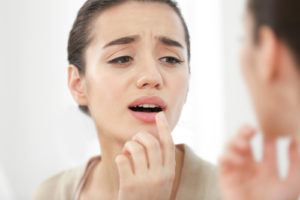Mouth Sores and Ulcers: What You Need to Know
Do you suffer from mouth sores or ulcers? Do you get a fever blister every time you go to the dentist? Millions of Americans suffer from canker sores and fever blisters.
What is a Canker Sore?

A canker sore is the same thing as an aphthous ulcer. These painful sores occur inside the mouth, usually on the tissue lining the inside of the cheeks and lips, on the tongue, or even at the back of the throat.
Aphthous ulcers are very painful and come in three different categories.
-
Minor Aphthous Ulcers
This is the most common type of aphthous ulcer or canker sore. Minor aphthous ulcers are round or oval, about six millimeters in diameter, and last for about seven to ten days.
-
Major Aphthous Ulcers
These are less common and extremely painful. Major aphthous ulcers are much larger (they can be over a centimeter in diameter) and last much longer (they can last up to six weeks).
-
Herpetiform aphthous ulcers
The last type of aphthous ulcers is named after the herpes virus, not because it is caused by the virus, but because it bears a resemblance to the types of sores caused by the herpes virus. Herpetiform aphthous ulcers occur in small clusters of multiple sores.
All aphthous ulcers have some things in common. They all appear yellowish-to-whitish in color and have a round or oval shape. The ulcer itself is surrounded by inflamed tissue, which gives the appearance of a red ring around the ulcer. They are typically very painful.
What Causes Canker Sores?
The exact cause of aphthous ulcers or canker sores is unknown. They often occur after injury to the tissue, like biting your lip or tongue. They sometimes arise after trauma to the inside of the mouth, like an oral surgery. Many people experience canker sores during periods of anxiety or stress.
What Can You Do about Canker Sores?
Because the cause is unknown, it is not possible to prevent aphthous ulcers. Any treatment works to alleviate the symptoms of the painful sores. Due to the relatively brief nature of minor aphthous ulcers, most people simply “wait it out”. Major aphthous ulcers warrant a dental visit and some treatment because of their longer duration.
Your dentist can do several things to alleviate your pain.
The first is to prescribe a pain-relieving mouthwash or a topical steroid ointment. If you suffer from ulcers frequently, it is a good idea to keep these prescriptions in your refrigerator to have it on hand.
Another treatment option to reduce the pain of aphthous ulcers is a laser treatment. Certain types of laser energy applied to ulcerated or inflamed tissues promotes faster healing.
What is a Fever Blister?
Fever blisters and cold sores are both mouth sores caused by the Herpes Simplex Virus type 1. This is NOT the same virus that causes the sexually transmitted disease, genital herpes. HSV-1 is a different strain of the herpes virus that typically affects the mouth.
Fever blisters or cold sores occur frequently on the outer portion of the lip. People who suffer from cold sores know the tell-tale tingle of the skin when a cold sore is about to occur. When caught in this early stage, you can easily treat the sore with anti-viral medications or ointments to shorten the duration of the sore.
Oral herpetic sores can also occur inside the mouth, usually on the roof of the mouth. Herpetic ulcers are different from aphthous ulcers in that they always occur in clusters, and they only affect gum tissue that rests on top of the bone. They do not occur on the lining of cheeks, lips and tongue.
Herpetic mouth sores begin as a small cluster of fluid-filled bumps that soon burst, forming painful ulcers. In severe cases, the ulcers can be so close together that they appear to be one large ulcer.
How Do You Treat Oral Herpes Sores?
When caught early enough, your dentist can prescribe an antiviral medication or ointment to put on the sore. You can take these medications later in the lifespan of the fever blister, but they will not have much effect as their main advantage is in shortening the duration of the sore.
Is It Important to Know the Difference between Aphthous Ulcers and Oral Herpes?
There is a difference in the treatment of these two different types of sores, and your dentist can easily tell which is which with a quick oral exam or even just a photo of the sore. Dr. Ann and Dr. Lauren will diagnose it correctly and prescribe the appropriate treatment to shorten its lifespan and alleviate your pain. If you buy any over-the-counter ointments for cold sores, make sure to read the instructions very carefully and follow them closely.
How Can You Manage the Pain of Mouth Sores at Home?
If you choose to simply wait for your mouth sore to heal on its own, here are a few tips for reducing the pain it causes.
- Avoid hot, spicy, or acidic foods and beverages. This includes coffee, soda, sparkling water, and alcohol.
- Use an over-the-counter mouthrinse for mouth sores like Colgate’s Peroxyl.
- Switch to mild oral hygiene products like Biotene. The sodium lauryl sulfate in most toothpastes and the alcohol in most mouthrinses will irritate any mouth sores.
- Hold a small piece of ice against the ulcer for a few minutes at a time. The cold will soothe and numb the sore for a short time.
Do You Suffer from Ulcers and Mouth Sores?
Call today to schedule a consultation with Dr. Ann and Dr. Lauren. They will properly diagnose your condition and give you the tools you need to manage your pain when the next one occurs.
